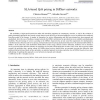Free Online Productivity Tools
i2Speak
i2Symbol
i2OCR
iTex2Img
iWeb2Print
iWeb2Shot
i2Type
iPdf2Split
iPdf2Merge
i2Bopomofo
i2Arabic
i2Style
i2Image
i2PDF
iLatex2Rtf
Sci2ools
119
click to vote
COMCOM
2004
2004
SLA-based QoS pricing in DiffServ networks
The availability of high-speed transmission media and networking equipment in contemporary networks, as well as the evolution of quality-demanding applications has focused research interest on the provision of advanced qualitative services in addition to the traditional best-effort model of the Internet. A number of alternatives for service differentiation and QoS provisioning have been proposed and standardized, but in the case of backbone, transport networks the DiffServ architecture has prevailed, due to its scalability and deployment feasibility. The provisioning of services according to the DiffServ framework has in turn raised the requirements for interdependent, controlled resource allocation and service pricing, with particular needs for pricing mechanisms that preserve the potential and flexibility of DiffServ. At the same time, such mechanisms should reflect resource usage, allocate resources efficiently, reimburse costs or maximize service provision profits and lead custome...
| Added | 17 Dec 2010 |
| Updated | 17 Dec 2010 |
| Type | Journal |
| Year | 2004 |
| Where | COMCOM |
| Authors | Christos Bouras, Afrodite Sevasti |
Comments (0)

